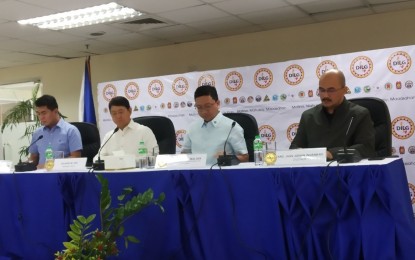
Department of the Interior and Local Government (DILG) Secretary Eduardo Año (2nd from left). (PNA photo by Christopher Lloyd Caliwan(
MANILA -- Local government units (LGUs) in Metro Manila are among those which are the most compliant with the campaign to clear roads of obstructions nationwide, less than a month before the 60-day deadline imposed by the Department of the Interior and Local Government (DILG) lapses.
In a press briefing on Tuesday, Interior Secretary Eduardo Año said Metro Manila is highest in terms of compliance followed by Cagayan Valley with 77.5 percent of its LGUs complying, Central Luzon with 62.3 percent, Central Visayas with 58.3 percent, Calabarzon with 53.5 percent and Western Visayas with 52.6 percent.
Based on the latest compliance report submitted to the DILG’s Bureau of Local Government Supervision (BLGS), all road clearing operations are going smoothly in all 17 local government units in Metro Manila in compliance with DILG Memorandum Circular 2019-121 issued on July 29, 2019 that had set the 60-day deadline for LGUs.
“We are pleased with the support, cooperation, and compliance of Metro mayors to the presidential directive but we need to do more and we expect them to sustain their efforts in order to help clear the streets of Metro Manila of traffic,” Año told reporters.
“As of today (Sept. 3), a total of 139,959 meters of roads and 52,831 meters of sidewalk in Metro Manila have been reportedly cleared of obstructions and illegal structures,” he added.
The Interior Secretary said among the LGUs in Metro Manila that have complied with the order are the cities of Marikina, Malabon, Navotas, Pasay, San Juan, Valenzuela and municipality of Pateros.
According to the BLGS report, as of Sept. 2, 13 LGUs have ordinances on road clearing operations, while four LGUs -- Makati City, Malabon City, San Juan City, and Pateros -- issued Executive Orders and established task forces to carry out the road clearing operations.
All LGUs in the metropolis have also completed an inventory of roads and conducted road clearing operations.
He also cited the best practices of some LGUs particularly Marikina City and Valenzuela City which both strengthened the implementation of the ordinances on road clearings as well as the coordination with the barangay officials which serves as their front-liner.
“In Marikina City, for example, obstructions are largely absent and the clearing of roads has been deemed as a non-issue due to the strict implementation of city ordinances regulating the use of sidewalks and roads. The city, then, focuses on area cleaning usually done through communities and barangays,” he stressed.
He said that road clearing has been institutionalized in Marikina through the regular provision of resources to the assigned task force and the inculcation of values to communities and students.
“Marikina’s experience reveals how effective the Memorandum can be in reclaiming roads and public areas once fully adopted and sustained by the LGU,” said Año.
He also reported the Valenzuela City’s strategy centers mainly on involving punong barangays not just in the conduct of the operations, but in information, education, and communication initiatives relating to the Memorandum. Reporting of obstructions can be coursed through the barangays, and progress updates are regularly posted in their social media channels
The DILG Secretary said the most common obstructions cleared in Metro Manila include illegally-parked vehicles, sidewalk vendors, street dwellers, and barangay outposts, among others.
Año said the clearing operations has also resulted in the dismantling of 1,444 illegal vendors, 49 illegal terminals, 1,292 illegally parked vehicles and 813 other obstructions.
In other LGUs nationwide, 43.3 percent have reportedly been cleared.
Aside from conducting road clearing operations, the DILG also ordered the amendment or revisiting of local ordinances related in clearing all road blockings, to prepare an inventory of roads within their jurisdiction, to develop and implement displacement strategies and cause the rehabilitation of recovered public roads.
However, Ano said maintaining and sustaining clear roads remain to be a challenge as there were instances, particularly in Metro Manila, when illegal occupants tend to go back to squatting after the operation.
“I prod all mayors nationwide to sustain the clearing of the roads for the benefit of the general public… The real test of the performance of the local chief executives lies in their consistency of maintaining the cleared roads beyond the September 29 deadline with the support of the police and the Barangays,” he said.
The DILG chief warned that the sanctions on local government officials who are unable to comply with the order of the President would range from a reprimand, suspension, to dismissal from the service.
After the 60-day deadline on Sept. 29, Año assures that he would review the accomplishments of all LGUs.
He also said that all road clearing operations in the country apply to all, regardless of political affiliation and that illegally constructed structures on government lots will be dismantled whether they are government or private entities.
Meanwhile, DILG Undersecretary and spokesperson Jonathan Malaya said that BLGS data show that 707 LGUs in the country reported having conducted road clearing operations; 397 LGUs reported having enacted or revisited their ordinance relating to road clearing and banning of illegal construction; 931 reported to have completed an inventory of roads within their jurisdiction; 668 reported having displacement strategies in place for those affected by the clearing operations; and 609 reported to have rehabilitation efforts on recovered public roads.
He said the DILG will also be shifting to an impact and progress-based reporting mechanism about the road clearing efforts of LGUs. (PNA)
